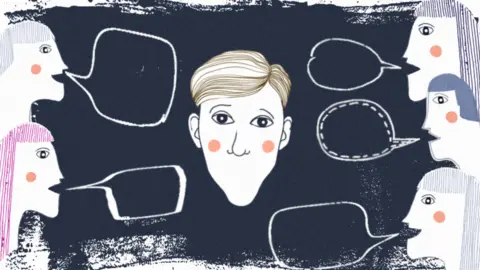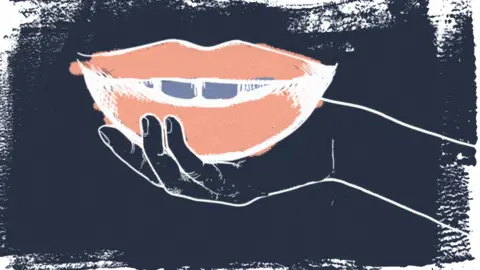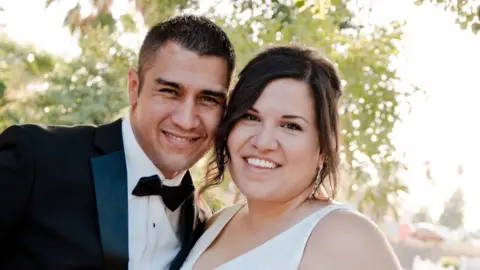'One stroke took my speech away - I think another brought it back'
 BBC
BBCPeter lost his ability to speak after a stroke four years ago, at the age of 73. But earlier this year he woke up one morning and suddenly he could speak again. Soon afterwards he discovered he'd had another stroke. Could the second stroke have returned his speech?
The day that Peter regained his speech, he was on holiday in Devon with his family.
"I woke up as usual. Carol was on the other side of the bed. I stood up and spoke to her, but it didn't feel weird. It felt like I was talking to my wife - like the most natural thing to do.
"I kept talking to her, and her mouth just dropped open. She said, 'Pete, you're speaking!'"
"I was going: 'Come on! Don't stop! Don't stop! Don't stop because it might go away again. Keep going, keep going!'" remembers Carol.
Their son, Jonathan, who was in the next room, heard two people having a conversation and came rushing in. "What's going on, Mum?" he said. "I thought your voice had dropped! Who is that deep voice?"
"I said, 'It's your father speaking!'" says Carol. "We all started crying and laughing at the same time. It was very emotional because it had been so long."
It was such a shock, nobody can remember what Peter's first words in four years were.
"Carol wasn't interested in what I said, she was more interested in the fact that I was talking," says Peter.

Find out more
- Peter and Carol spoke to Dr Mark Porter on Inside Health on BBC Radio 4
- Listen to their interview here

They all went out to celebrate, but Carol soon noticed that the left-hand side of Peter's mouth was drooping. Later in the day he complained of weakness in his legs - he had difficulty walking, and his son Jonathan had to hold him up.
They took a taxi to the nearest hospital where a scan suggested he'd had another stroke. Fortunately, however, the negative effects were only temporary. Peter's mouth stopped drooping and his legs returned to normal. And months later, he's still talking.
The couple are convinced that this second stroke somehow "dislodged" something in Peter's brain - something that had stopped him talking after the first stroke.
However, Alex Leff, a professor of cognitive neurology and an expert in the recovery of language after stroke and brain injury, offers little support for this theory. He says you can think of the brain as a network, and of a stroke as an event that "takes out" some of the language nodes. In many cases, patients "reroute some of the language functions using what is remaining in the brain", he says - but when they have had severe language problems, like Peter, this tends to be a slow process, not a sudden one.
The case is "certainly very unusual", he says.

Aphasia
- Aphasia is the technical term for the difficulties with language or speech that a person may experience after a stroke, or other brain injury
- There are several different types
- With Broca's aphasia (or non-fluent aphasia) speech is limited mainly to utterances of less than four words, which take a lot of effort to produce - the person may understand speech well, and be able to read, but is usually limited in writing
- People who have anomic aphasia experience a persistent inability to find the words for the things they want to talk or write about, particularly the significant nouns and verbs - they understand speech well and usually read adequately
- Peter, on the other hand, had no problems with reading or writing during the four years he could not speak
Sources: National Aphasia Association, NHS

Carol was with Peter when he had his first stroke. They had been out, but Peter hadn't been feeling well, so Carol was driving them back to their Gloucestershire home.
"I asked him for the time and he didn't answer me," says Carol. "I asked him again. I just sensed that something was wrong. When you live with somebody and have been married 52 years you know everything, don't you?"
Afterwards, over a period of weeks, Peter gradually felt his ability to speak fade away.
"I found it more and more difficult to have a proper conversation," he says. "Words were difficult to find, I couldn't get any flow to sentences. The words were coming out staccato-like.
"In the end it felt almost impossible to speak. I could only say 'Yes' and 'No' and occasionally a very short phrase. That was the best I could do."
Carol found it heartbreaking to see her husband, a retired engineer who she describes as a "clever and eloquent man", unable to speak. The whole family shared her distress.
Their daughter, Jane, admitted to her mother, "I really miss Dad."
Carol told her, "Well, he's not dead, he's not gone away. It's awful for us, but it's dreadful for him - and that's what you've got to remember."
Despite being unable to form words, Peter says that he was always able to understand everyone's conversation.
"I always knew exactly what was going on around me, so I was completely aware - but being unable to converse with people is the worst," he says.
The couple perfected a system to communicate with each other. Carol would ask yes/no questions and Peter would respond with a thumbs-up or thumbs-down gesture. He also carried round a pencil and pad, writing down what he wanted to say.
"We got by very well," he says.
"We made light of it," Carol adds. "Well, we've got to carry on, we're getting old. You expect something to happen."
Peter has a strong interest in photography, so if they went to a camera shop and he wanted to ask a technical question he would write it down in advance.
Sometimes Carol would explain the need for this unusual form of communication.
"I would tell them, 'My husband's had a stroke. He can't speak so he's written down a question for you.'"

During his silent years Peter would often spend the day reading or working on mathematical modelling. Carol remembers that he was always scribbling algorithms and equations in notebooks. "It kept him quite busy actually."
Peter says the relief of being able to speak again is overwhelming. He gets tearful about it.
"Being able to communicate with other people is almost all of being a human being," he says. "When that goes, it's a big part of you gone and my family felt that I had sort of disappeared. You can't really convey emotion with 'Yes' and 'No'."
They tried to include him in the conversation, and make him laugh, but it wasn't the same, he says.
The most challenging part was listening to people say things that he didn't agree with.
"I found it particularly frustrating when people were arguing about something and I couldn't respond in the conversation - it was like losing every argument," Peter says.
"It's nice to be able to argue again and make myself a nuisance."
His first big debate was about Brexit with friends. "They said to me, 'Oh, I'm glad you're back!'"
Carol chips in: "Oh he loves an argument, he could argue with an empty room."
Peter's speech is near-perfect now, apart from some slurring when he gets tired in the evenings. But everyone has remarked on how his accent has changed.
"People say that I am speaking a bit posh now," he says.
"I tell them that I'd always been a bit posh really, but I'd tried to hide it from them."
Banter and friendly bickering is clearly a big part of Peter's relationship with Carol.
She admits that she got so used to speaking for him that she's now having to adapt to him piping up again.
"It's a habit," she says. "When we were at the hospital I kept talking for him. I've got to learn to shut up and button it. I have had a bit of a monopoly the past few years."
On the day he could suddenly speak again, Peter looked pointedly at the nurse and said, "I think Carol is going to regret this."
"At times, I do," she admits. "I told you to be quiet the other day, you've done nothing but natter."
But both of them worry he may lose his new-found ability again.
"It's such a delicately balanced thing," says Peter, ever the engineer.
"It's like a watch that's been knocked with a hammer and come back, and it could have another knock and go away - like a bad contact."
Peter asked that the BBC not use his full name.

You may also be interested in:

Adam and Raquel Gonzales had been together for five years when he woke up one morning with no idea who she was - he had lost all memory of marrying her. But Raquel, who knew Adam had once had a brain injury, was determined to win him over again.

